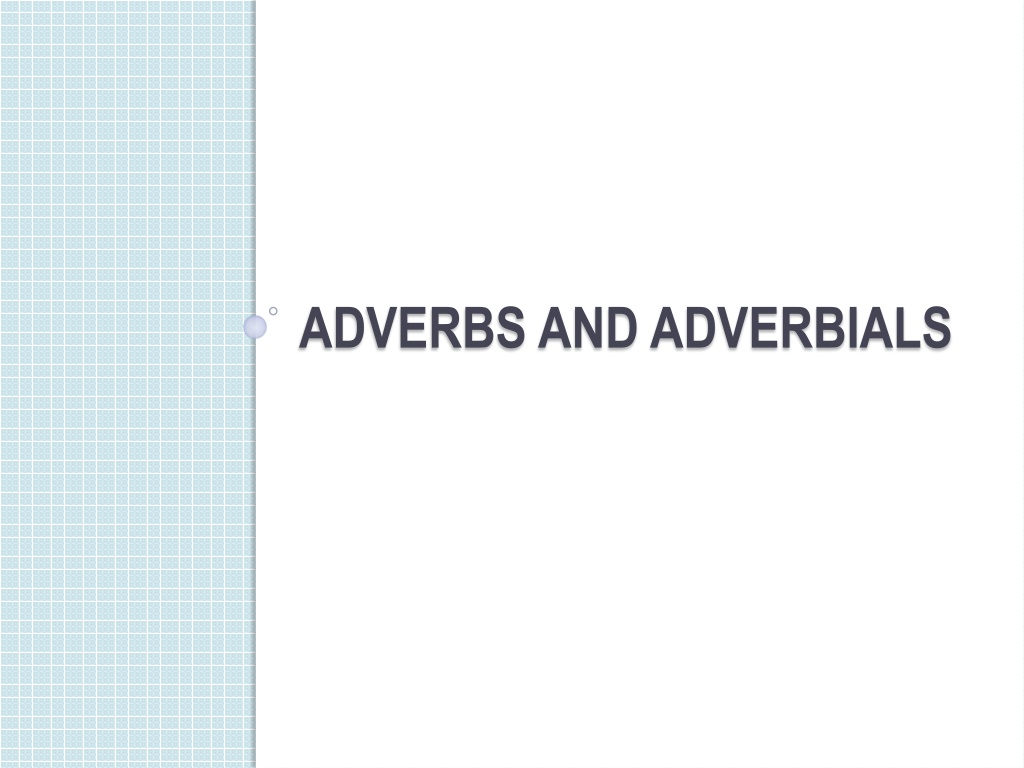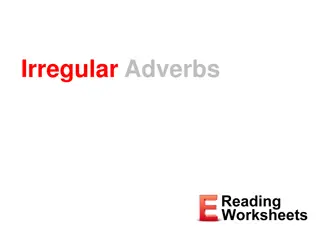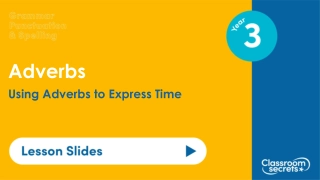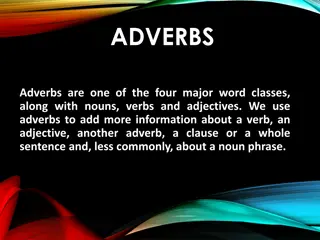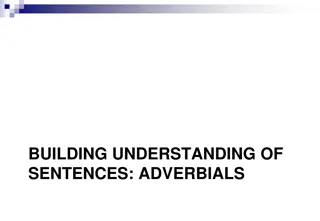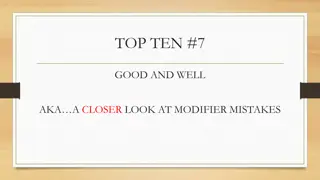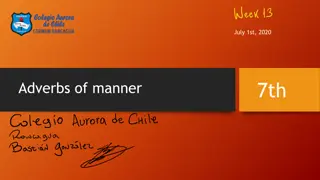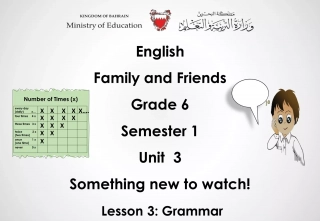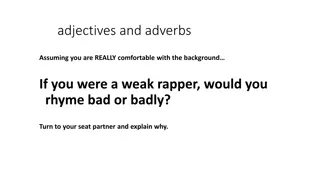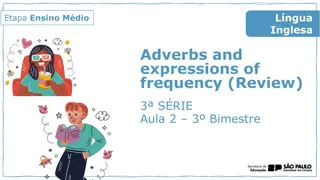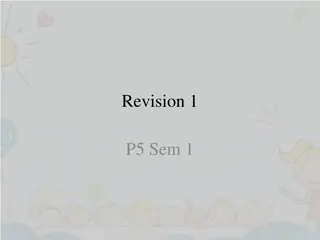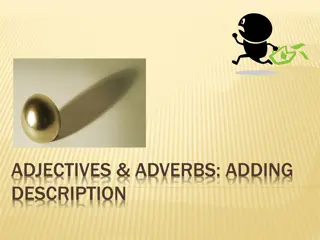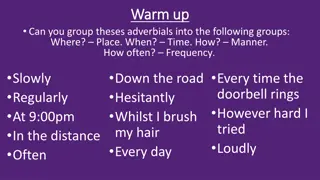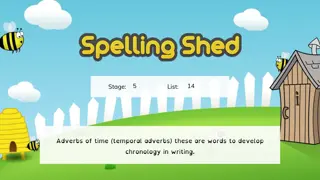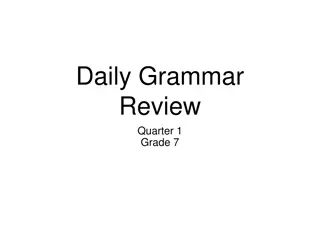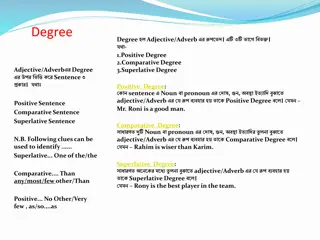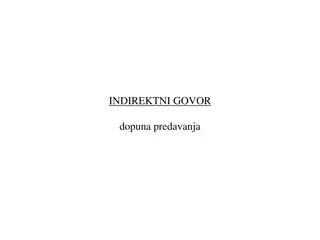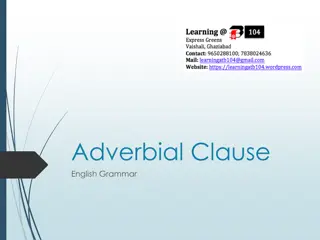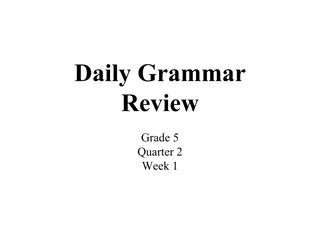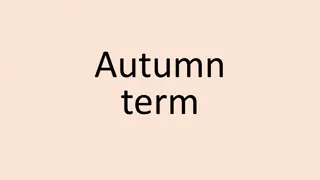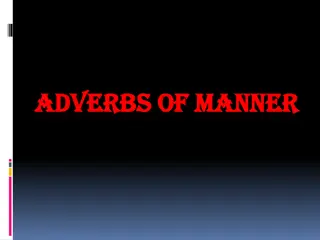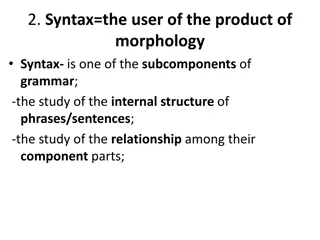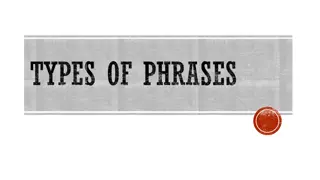Understanding Adverbs and Adverbials in English Grammar
Adverbs modify various elements in a sentence, such as verbs, adjectives, and even whole clauses. Not all adverbs end in "ly," and they can belong to categories like time, place, degree, and discourse markers. Adverbials are strings of words that modify functions, including prepositional phrases, noun phrases, subordinate clauses, and non-finite clauses. Explore examples of adverbial prepositional phrases and classroom activities to enhance understanding of creating atmosphere in writing with prepositional phrases.
Download Presentation

Please find below an Image/Link to download the presentation.
The content on the website is provided AS IS for your information and personal use only. It may not be sold, licensed, or shared on other websites without obtaining consent from the author. Download presentation by click this link. If you encounter any issues during the download, it is possible that the publisher has removed the file from their server.
E N D
Presentation Transcript
Adverbs An adverb modifies another element of a sentence; in fact, aside from nouns (which are modified by adjectives), they can modify almost every other word type: verb traditionally decorated adverb She sang extremely loudly adjective slightly smaller pronoun nearly everyone 2
Adverbs Adverbs can also modify whole clauses, phrases or even sentences: I spotted only one crocodile only modifies the noun phrase one crocodile We made it almost to the end almost modifies the prepositional phrase to the end No one can see them anyway anyway modifies the sentence as a whole. 3
Adverbs Not all adverbs end in ly Time adverbs: later, never, often, once, soon, today, tomorrow, Place adverbs: here, there, everywhere. Degree adverbs: almost, just, quite. Discourse markers: however, nevertheless, therefore Not all words that end in ly are adverbs Adjectives: lovely, deadly, jolly, lonely. Nouns: bully, holly, jelly, family. Verbs: bully, multiply, apply, supply. 4
Adverbials An adverbial is a string of words that have a modifying function Four common types of adverbial are prepositional phrases He arrived completely without warning.. noun phrases Jane telephoned me last night. subordinate clauses If you work hard, you ll pass. non-finite clauses. Slipping on the icy surface, the boy grabbed hold of my hand. 5
A great example of adverbial prepositional phrases Rosie s Walk by Pat Hutchins Rosie the hen went for a walk, across the yard, around the pond, over the haycock . . . 6
A classroom example Where might we go? Exploring atmosphere with prepositional phrases Learning objective: Understand how to create atmosphere when describing a journey using prepositional phrases by the forgotten river under the chestnut tree beyond the sea over the horizon in the shadows in the back of beyond over the rainbow What are these places like? Who might you meet there? What might happen in this place? Choose a non-finite verb to be modified 7
Adverbial detail: a KS3/4 example Opening to Lord of the Flies, William Golding: consider what the highlighted adverbial detail adds to our view of the characters and their surroundings: The boy with fair hair lowered himself down the last few feet of rock and began to pick his way toward the lagoon. Though he had taken off his school sweater and trailed it now from one hand, his grey shirt stuck to him and his hair was plastered to his forehead. All round him the long scar smashed into the jungle was a bath of heat. He was clambering heavily among the creepers and broken trunks when a bird, a vision of red and yellow, flashed upwards with a witch-like cry; and this cry was echoed by another. Hi! it said. Wait a minute! . ..The owner of the voice came backing out of the undergrowth so that twigs scratched on a greasy wind-breaker. The naked crooks of his knees were plump, caught and scratched by thorns. He bent down, removed the thorns carefully, and turned around. He was shorter than the fair boy and very fat. He came forward, searching out safe lodgments for his feet, and then looked up through thick spectacles. 8
Fronted adverbials These simply refer to single adverbs, adverbial phrases and clauses used at the start of a sentence or paragraph, to emphasise or connect ideas. They have become emblematic of concerns about teaching to the SATs: see Michael Rosen s blog from March 2016: michaelrosenblog.blogspot.com/2016/03/health-alert- how-fronted-adverbial.html an article in The Guardian from May 2017: https://www.theguardian.com/education/2017/may/09/fron ted-adverbials-sats-grammar-test-primary 9
